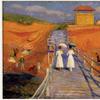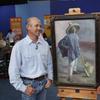All Power to the People: Black Panthers at 50
- OAKLAND, California
- /
- November 09, 2016
The Oakland Museum of California's (OMCA) new exhibition, All Power to the People: Black Panthers at 50, opened on October 8 to coincide with the 50th anniversary of the Black Panther Party's founding in Oakland and continues OMCA’s commitment to examining topics and themes that are socially relevant and meaningful to the community through exhibitions, programs, and partnerships.
Organized by an award-winning team led by exhibition curator René de Guzman, All Power to the People explores the Party’s stories of human achievement and struggle to support the needs of the oppressed. The exhibition delves into aspects of the Party that are not often told, such as its survival programs, the presence of women and rank and file members, its use of media and art, and its founding Ten Point Program that continues to inform and inspire contemporary movements of change today.
The exhibition runs through February 12, 2017, in the Museum’s Great Hall.
All Power to the People: Black Panthers at 50 examines the Black Panther Party as a necessary, innovative, and human response to societal needs. Informed by insights from former Black Panthers, artists, scholars, and community members, the exhibition features art installations, historical photographs and media presentations, rare artifacts, and contemporary works of art. Designed to create empathy and emotional resonance, the exhibition will include an unprecedented variety of objects, art works, and materials from OMCA’s collections and other public and private sources that illuminate the historical and social contexts of the late 1960s that precipitated the founding of the Black Panthers, presenting the complex stories of the Party and its work to make revolutionary change possible.
















